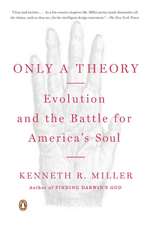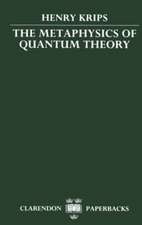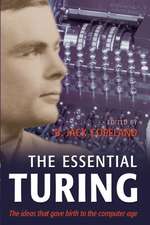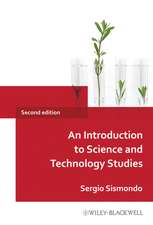Niels Bohr and the Philosophy of Physics: Twenty-First-Century Perspectives
Editat de Jan Faye, Henry Folseen Limba Engleză Hardback – 18 oct 2017
| Toate formatele și edițiile | Preț | Express |
|---|---|---|
| Paperback (1) | 234.92 lei 6-8 săpt. | |
| Bloomsbury Publishing – 17 apr 2019 | 234.92 lei 6-8 săpt. | |
| Hardback (1) | 718.60 lei 6-8 săpt. | |
| Bloomsbury Publishing – 18 oct 2017 | 718.60 lei 6-8 săpt. |
Preț: 718.60 lei
Preț vechi: 1030.07 lei
-30% Nou
Puncte Express: 1078
Preț estimativ în valută:
137.55€ • 149.46$ • 115.61£
137.55€ • 149.46$ • 115.61£
Carte tipărită la comandă
Livrare economică 21 aprilie-05 mai
Preluare comenzi: 021 569.72.76
Specificații
ISBN-13: 9781350035119
ISBN-10: 1350035114
Pagini: 392
Ilustrații: 8 b/w illustrations
Dimensiuni: 156 x 234 mm
Greutate: 0.7 kg
Editura: Bloomsbury Publishing
Colecția Bloomsbury Academic
Locul publicării:London, United Kingdom
ISBN-10: 1350035114
Pagini: 392
Ilustrații: 8 b/w illustrations
Dimensiuni: 156 x 234 mm
Greutate: 0.7 kg
Editura: Bloomsbury Publishing
Colecția Bloomsbury Academic
Locul publicării:London, United Kingdom
Caracteristici
Brings together a respected team of contributors to discuss the contribution and relevance of Bohr's work to contemporary philosophy of science
Notă biografică
Jan Faye is a philosopher of science at the University of Copenhagen, Denmark.Henry Folse is Professor Emeritus at Loyola University New Orleans, USA.
Cuprins
General Introduction Part I: Understanding Bohr's Philosophical Background1. Why Do We Find Bohr Obscure? Reading Bohr as a Philosopher of Experiment Kristian Camilleri (History and Philosophy of Science Department, University of Melbourne)2. On Bohr's Transcendental Research Program Michel Bitbol (Director of Research, CNRS, Paris) 3. Transcendental Versus Quantitative Meanings of Bohr's Complementarity Principle Patricia Kauark-Leite (Philosophy Department, The Federal University of Minas Gerais) 4. Complementarity and Pragmatic Epistemology: A Comparison of Bohr and C.I.Lewis Henry Folse (Professor of Philosophy, Loyola University) 5. Complementarity and Human Nature Jan Faye (Associate Professor, University of Copenhagen) 6. Bohr's Relational Holism and the Classical-quantum Interaction Mauro Dorato (Professor of Philosophy, University of Rome) 7. Complementarity As a Route to Inferentialism Stefano Osnaghi (ICI Berlin Institute for Cultural Inquiry) 8. Bohr's Thought from the Twentieth to the Twenty-First Century Arkady Plotnitsky (Professor of English, Theory and Cultural Studies, Purdue University) Part II: Bohr's interpretation of quantum mechanics in twenty-first century physics9. Complementarity and Quantum Tunneling Slobodan Perovic (Associate Professor of Philosophy, University of Belgrade) 10. Bohr and the Problem of the Quantum-to-Classical Transition Maximillian Schlosshauer & Kristian Camilleri (Department of Physics, University of Portland) 11. Bohr's epistemological contribution to the quantum-classical cut problems Manuel Bächtold (Philosophy of Science, Université Montpellier) 12. An Exploration of the History and Possible Future of Bohrian Quantum Empiricism Scott Tanona (Associate Professor of Philosophy, Kansas State University) 13. An Everett Perspective on Bohr and EPR Guido Bacciagaluppi (Associate Professor of Foundation of Physics, Utrecht University) 14. Niels Bohr and the Mathematical Formalism Dennis Dieks (Professor of Physics, Utrecht University) 15. From Classical Concepts to Commutative Algebras Klaas Landsman (Professor of Physics, Radboud University)16. Why QBism Is Not the Copenhagen Interpretation and What John Bell Might Have Thought of It N. David Mermin (Professor of Physics, Cornell University)
Recenzii
The richness of the book becomes evident to anyone who interacts with it, and it is useful for a wide audience.
This is a handsome, well-edited, fascinating volume with a subject that is remarkable in at least two ways. Firstly, it is striking that now, even after a century, there should be so much to say about Bohr's interpretation of quantum mechanics . The second remarkable thing is that Bohr's thinking, his explanations . should feel so relevant.
Faye (Univ. of Copenhagen, Denmark) and Folse (emer., Loyola Univ.) provide a good introduction to Bohr's ideas. Contributors take up subjects ranging from Bohr as a pragmatist and holist to Bohr's empiricism and formalism ... The book includes copious notes and references, and only a few equations to unsettle those with math phobia. Summing Up: Recommended. Graduate students, researchers, faculty.
An important volume edited by two outstanding Bohr scholars, who also make perceptive contributions of their own. The excellent essays here bring perspectives on Bohr into the twenty-first century, both in terms of scholarship and in connection with current developments in the foundations of physics. A must read for anyone who wants to understand how the great debates in the early years of quantum physics relate to scientific and philosophical thinking today.
The thoughtful essays in this rich collection make clear that Niels Bohr's earnest, dogged efforts to grapple with the conceptual implications of quantum theory retain the power to inspire --- and provoke --- new generations of scholars. The essays look back to Bohr's own intellectual roots, even as they focus on still-open questions at the heart of quantum theory. Brimming with insights, this book will be of interest to physicists, philosophers, and historians of science.
This book brings together the top historical, philosophical, and scientific experts on Niels Bohr. They approach the subject both critically and charitably, providing a fair assessment of Bohr's contributions to the foundations of quantum physics. This book represents the cutting edge in scholarship on Niels Bohr's lasting contributions to the foundations of physical science. Bohr's ideas about quantum physics are subtle, and frequently misunderstood; this book provides the clearest picture yet of what Bohr was saying, and of its relevance for the ongoing progress of physics.
This is a handsome, well-edited, fascinating volume with a subject that is remarkable in at least two ways. Firstly, it is striking that now, even after a century, there should be so much to say about Bohr's interpretation of quantum mechanics . The second remarkable thing is that Bohr's thinking, his explanations . should feel so relevant.
Faye (Univ. of Copenhagen, Denmark) and Folse (emer., Loyola Univ.) provide a good introduction to Bohr's ideas. Contributors take up subjects ranging from Bohr as a pragmatist and holist to Bohr's empiricism and formalism ... The book includes copious notes and references, and only a few equations to unsettle those with math phobia. Summing Up: Recommended. Graduate students, researchers, faculty.
An important volume edited by two outstanding Bohr scholars, who also make perceptive contributions of their own. The excellent essays here bring perspectives on Bohr into the twenty-first century, both in terms of scholarship and in connection with current developments in the foundations of physics. A must read for anyone who wants to understand how the great debates in the early years of quantum physics relate to scientific and philosophical thinking today.
The thoughtful essays in this rich collection make clear that Niels Bohr's earnest, dogged efforts to grapple with the conceptual implications of quantum theory retain the power to inspire --- and provoke --- new generations of scholars. The essays look back to Bohr's own intellectual roots, even as they focus on still-open questions at the heart of quantum theory. Brimming with insights, this book will be of interest to physicists, philosophers, and historians of science.
This book brings together the top historical, philosophical, and scientific experts on Niels Bohr. They approach the subject both critically and charitably, providing a fair assessment of Bohr's contributions to the foundations of quantum physics. This book represents the cutting edge in scholarship on Niels Bohr's lasting contributions to the foundations of physical science. Bohr's ideas about quantum physics are subtle, and frequently misunderstood; this book provides the clearest picture yet of what Bohr was saying, and of its relevance for the ongoing progress of physics.














